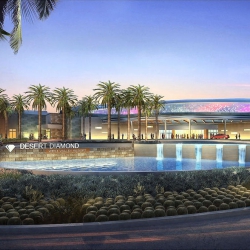
The Tohono O’odham Nation owns three other casinos in Arizona which carry the “Desert Diamond” brand name.
The Tohono O’odham Nation received permission from the US Department of the Interior’s Bureau of Indian Affairs for a $400 million expansion of its casino in Glendale, Arizona. The tribe has been fighting for years to build a Class III casino in the Phoenix area.
With the DOI’s approval, the Tohono O’odham Nation can transform a Class II gaming venues into a full-fledged Las Vegas-style Class III facility, complete with table games and true slot machines. The state has been fighting the tribe in a legal battle for over 10 years.
Arizona Fought Casino for 15 Years
Arizona’s officials claim the Tohono O’odham did not own the land being used for the casino in 2002, when Arizona established its Indian gaming compact. According to the 1988 Indian Gaming Act, tribal lands had to be recognized by the Interior Department. In short, Arizona has argued that the tribe was using private land, instead of sovereign territory.
The Department of the Interior (DOI) ruled this week that the tribe’s land satisfies federally-mandated Indian gaming regulations. That means the Tohono O’odham have the right to procede with a massive expansion of their gaming complex, which is located in a temporary warehouse about one mile from the University of Phoenix Stadium, where the Arizona Cardinals play.
The current facility has 1,000 electronic bingo machines. While such gaming machines look much like a slot machine, they use the game mechanics of bingo to determine results. Bingo-style results are required in Class II gaming. If one player wins, it means other players in the game do not. In Class III gaming machines, the result of one spin has no effect on the odds of other spins.
$400 Million Casino Expansion
The $400 million expansion of the Tohono O’odham casino will include 1,089 Class III slot machines, 75 gaming tables, a 600-room hotel, a convention center, and 5 restaurants. When completed, the expanded casino will be the premier location in the The Tohono O’odham Nation’s gaming empire.
The Tohono O’odham Nation owns three other casinos in Arizona, under the “Desert Diamond” brand name. All three are full Las Vegas-style casinos, but none of them are in a major population center. Because the Glendale casino is going to be perfectly situated to draw Phoenix-area gamblers, it will be the most profitable Tohono O’odham Nation casino.
Near Arizona Cardinals’ Stadium
Being in such close proximity to the University of Phoenix Stadium is going to be a boon. At a time, there were rumors that one of Arizona’s casinos, owned by the Gila River Indian Community (also in Glendale), might buy naming rights to the University of Phoenix Stadium.
That is unlikely, because NFL Commissioner Roger Goodell continues to insist that the National Football League distance itself from the gambling industry. Sports betting is still illegal in Arizona, so Goodell might prefer to keep casino gambling at arm’s length.
NFL Commissioner Disapproves of Sports Betting
Even being near an NFL stadium might be a problem for the Tohono O’Odham’s Desert Diamond Casino. Despite the proximity, six other casinos are nearer to NFL stadiums. The Rivers Casino in Pittsburgh is the closest, as it is located on 0.2 miles from Heinz Field, home of the Pittsburgh Steelers.
When the Oakland Raiders move to Las Vegas in 2020 (or perhaps 2019), the Las Vegas Raiders’ stadium is likely to be as close or closer than the Tohono O’odham Nation casino is to the Cardinals’ home field.
US Department of the Interior
Since the 19th Century, the U.S. Department of the Interior’s “Bureau of Indian Affairs” has overseen the US federal government’s relations with Native American tribes. Despite using a term which is offensive to some these days, the Bureau of Indian Affairs often is the chief advocate for tribal interests in the United States.
Under the 1988 Indian Gaming Act, tribes which were recognized by the DOI before 1932 are given preference when it comes to building casinos on their reservation lands. Recognized ownership of reservation lands before 1932 usually means recognition, while tribes which had lands recognized after 1932 often have a harder time gaining recognition. Since states began approving private, non-tribal casinos in the early 2000s, some Native American gaming tribes have sought to buy non-tribal lands on which to build casinos.
Such plots of land still need to gain approval from the DOI, if a tribe plans to build a casino there. The East Windsor casino being built by the Mohegan Tribe and Mashantucket Pequot Tribe in Connecticut is one example, as that satellite casino gained approval by the state, but is still awaiting approval from the Interior Department. The First Light Casino being pushed by the Wampanoag Tribe and Genting Group in Massachusetts is another such example, though approval is tenuous in that case.
